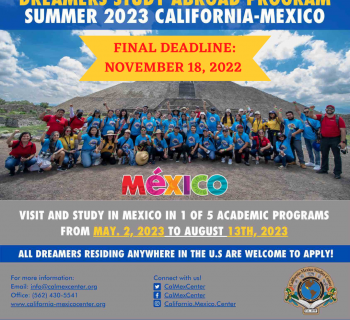Read full newsletter here: https://mailchi.mp/f58f80ea5996/california-leads-the-nation-in-providing-coronavirus-assistance-to-immigrants
–––––––––––––––––––––––––––––––––––––––––––––––––––––––––––––––––––
Immigrants without legal status can apply for California Coronavirus $500 grants
By: Matthew Ormseth ~ Los Angeles Times ~ May 18, 2020
Undocumented Californians may begin applying for disaster assistance payments of $500 per person and up to $1,000 per household.
The state government has made available $75 million to help a projected 150,000 undocumented immigrants weather the coronavirus crisis.
To qualify, applicants must show that they are ineligible for federal assistance programs stemming from the coronavirus pandemic, such as the CARES Act or federal unemployment benefits, and that they have endured a hardship from the pandemic. Only adults may apply. A state guide to common questions and answers about the program is posted online.
Twelve nonprofit groups are working with the state government to disburse the aid. The groups help applicants determine if they’re eligible for the assistance, apply for it and deliver payment cards to those who receive it. Applicants must contact the group administering the assistance in their... Read full article here
–––––––––––––––––––––––––––––––––––––––––––––––––––––––––––––––––––
La deportación de más de 900 niños migrantes en forma exprés
Por: Redacción , La Opinión – 20 de Mayo 2020
Las restricciones en las fronteras de Estados Unidos por la pandemia de coronavirus, le han permitido al Gobierno del presidente Donald Trump implementar algunas de sus medidas migratorias, como la deportación acelerada.
Esto ha afectado a diversos grupos, pero un reciente reporte de The New York Times indica que, según los datos disponibles del Departamento de Seguridad Nacional (DHS), entre marzo y abril se deportaron a 915 menores de edad.
Las expulsiones se dieron apenas llegaron a la frontera, en menos de 96 horas, como marca el nuevo protocolo, que en abril permitió la expulsión de 10,000 adultos, según datos de las propias autoridades.
El informe indica que 60 fueron enviados a sus hogares desde el interior de los Estados Unidos... Leer Artículo Completo Aquí
–––––––––––––––––––––––––––––––––––––––––––––––––––––––––––––––––––
Coronavirus in Tijuana: Paramedics risk their lives to help the sick
By MARCUS YAM, RUBEN VIVES, Los Angeles Times – May 21, 2020
The coronavirus is killing so many people in Tijuana that the morgue has run out of refrigerator space for bodies. As of Tuesday, the Mexican border city had confirmed 392 deaths.
On the front lines of the pandemic in Tijuana is the Mexican Red Cross. Its 13 ambulances handle the majority of emergency calls for the city of 1.8 million people. Lately that has meant as many as 40 coronavirus calls a day.
–––––––––––––––––––––––––––––––––––––––––––––––––––––––––––––––––––
CMSC-CHRCL to file class-action lawsuit against US Dept. of Education & Secretary Betsy DeVos
The California-Mexico Studies Center (CMSC) is working with the Center for Human Rights and Constitutional Law (CHRCL) to file a potential class-action lawsuit against the U.S. Department of Education and Secretary Betsy DeVos’ discriminatory exclusion of DACA, TPS, and other immigrant students from the CARES Act benefits for colleges and universities. While the bill does not reflect the exclusion of undocumented students currently enrolled in a higher education institution, the department determined that this population would not be eligible.
Thus, we are calling upon DACA / TPS recipients and Asylum seekers that were denied this benefit to become plaintiffs to file the lawsuit along with the CMSC and CHRCL. We are also calling upon organizations that want to get involved as plaintiffs.
To sign up as an individual, fill out this form: https://forms.gle/PTbfxriL82rVHafv9
To sign up as an organization, fill out this form: https://forms.gle/ZT5d5c2eZvQvhDEHA
Please share these forms and invite others to apply!
Feel free to contact me and/or Prof. Armando Vazquez-Ramos if you have any questions armando.vazquez-ramos@csulb.edu (562) 430-5541
–––––––––––––––––––––––––––––––––––––––––––––––––––––––––––––––––––
Supreme Court could allow Trump to end DACA protections for Dreamers
By: Nicole Prchal Svajlenka ~ Center for American Progress ~ May 13, 2020
Any day now, the U.S. Supreme Court will announce its long-awaited decision on Deferred Action for Childhood Arrivals (DACA), a policy offering work authorization and protection from deportation to hundreds of thousands of immigrants who came to the United States many years ago as children. If the court rules that the Trump administration’s termination of DACA was lawful, it will clear the path for the administration to end DACA and strip protections from these individuals after more than two years of legal challenges. Notwithstanding such a ruling, the administration will likely not have to throw DACA recipients out of the workforce and put them, their families, and communities in jeopardy. However, if the administration does choose to apply the decision in that way, it is hard to imagine a worse time to do so than during a global pandemic, when more than 200,000 DACA recipients are working on the frontlines of the response. Should the Supreme Court rule against DACA, the Trump administration can and should continue to accept and process renewals, giving DACA recipients piece of mind and giving Congress.. Read full article here
–––––––––––––––––––––––––––––––––––––––––––––––––––––––––––––––––––
For 'essential' Latinos, a high price to pay
By: Hailey Branson-Potts, Alejandra Reyes- Velarde, Matt Stiles, Andrew J. Campa ~ Los Angeles Times ~ May 17, 2020
For Lupe Martinez, who does the laundry at a Riverside nursing home, each day presented an agonizing choice: Go to work and risk getting the novel coronavirus or lose the $13.58-an-hour paycheck her family relies upon.
Martinez went to work.
Even after the masks started running low. Even, she said, after a patient whose room she had entered without protective equipment fell ill and was put into isolation.
Martinez, 62, tested positive for COVID-19 last month, followed by her 60-year-old husband, who had to stop working after having a heart attack last year. Her adult son and daughter, who live with them, also tested positive.
“There were many times I didn’t want to go to work,” said Martinez, coughing heavily as she spoke. “I didn’t want to get sick. My husband said, ‘Don’t.’ I said we can’t live. We have these bills. ... I had to push myself to go. I had a commitment to my family.” Read Full article here
–––––––––––––––––––––––––––––––––––––––––––––––––––––––––––––––––––
LATEST NEWS
- Major Supreme Court opinions set to be released: DACA, Trump's taxes, Gay rights, abortion (NBC News)
- Thousands of DACA recipients work on covid-19 front lines (Cronkite News)
- Joe Biden's failing Latino vote outreach (Politico)
- Newsom's proposed budget cuts Higher Ed force difficult choices (Ed Source)
- Arriesgo mi vida por el COVID-19 pero mañana puedo ser deportado (El Universal)
–––––––––––––––––––––––––––––––––––––––––––––––––––––––––––––––––––
COVID-19 & THE AMERICAS
–––––––––––––––––––––––––––––––––––––––––––––––––––––––––––––––––––
How many people are dying of coronavirus in Mexico? It's hard to say
By: Patrick J. Mcdonell, Kate Linthicum, Wendy Fry ~ LA Times ~ May 16, 2020
In cities across Mexico, morgues are full, funeral homes are jammed and crowded hospitals are turning patients away.
“My father is in a black bag in the back of that brown hearse,” said Gabriela Jacomé, a 43-year-old house cleaner waiting outside the San Nicolás Tolentino cemetery in Mexico City on a recent morning.
Vehicles carrying COVID-19 victims were gridlocked at the entrance along a main drag marked with yellow signs warning: “High risk of contagion!”
“We have to wait outside for hours to get in to pay final respects,” Jacomé said.
Such scenes are difficult to square with the country’s official death toll: 4,767 as of Friday. Read full article here
–––––––––––––––––––––––––––––––––––––––––––––––––––––––––––––––––––
Mexico begins lifting COVID-19 lockdown despite fears worst is still to come
By: David Agren ~ The Guardian ~ May 18, 2020
Local authorities across Mexico have resisted President Andrés Manuel López Obrador’s call to lift emergency coronavirus measures in municipalities without confirmed Covid-19 cases, warning that the pandemic is far from over.
Mexico has registered nearly 50,000 Covid-19 cases and more than 5,000 deaths, and its testing rate ranks among the lowest in Latin America, with just 0.4 tests per 1,000 people.
But on Monday, approximately 300 municipalities throughout the country – called “municipalities of hope” – were given the green light to restart economic activities and lift sheltering-in-place recommendations. Similar measures are scheduled to start 1 June in the rest of the country, while classes will resume the same day... Read full article here
–––––––––––––––––––––––––––––––––––––––––––––––––––––––––––––––––––
Why the United States needs to plan for the Coronavirus in the Americas
By Trevor Sutton, Dan Restrepo, and Joel Martinez Center for American Progress – May 5, 2020
The coronavirus pandemic is challenging the capabilities and resources of governments around the world, and the countries of Latin America and the Caribbean are no exception. The region’s widespread poverty, weak health infrastructure, and fragile economies mean its residents could suffer greatly if political leaders do not act swiftly to mitigate the crisis. To date, countries’ responses have varied from strict lockdown measures to relaxed approaches lacking urgency to outright denial. Of particular concern, the two most populous Latin American countries—Brazil and Mexico—have been the slowest to mobilize to contain the spread of the virus. In Venezuela, meanwhile, the pandemic has begun magnifying an already horrific humanitarian situation. Read full article here
–––––––––––––––––––––––––––––––––––––––––––––––––––––––––––––––––––
Urgent call upon Governor Newsom to help Mexico respond to COVID-19
The California-Mexico Studies Center, Inc. ~ April 14, 2020
Given Governor Gavin Newsom’s commendable "Nation State" response to President Trump’s intransigence and failure to provide California with critical federal government assistance, the governor emerges as a novel international moral leader to abate the COVID-19 pandemic crisis.
Last week, during an interview on MSNBC, the Governor stated that he would use California’s massive purchasing power “as a nation-state” to secure the medical supplies that Trump’s government has failed to provide. In fact, the governor expressed that “California might even export some of those supplies to other states in need”.
This is the fundamental reason why the California-Mexico Studies Center is calling upon Governor Newsom and California’s legislative leaders to immediately respond to Mexico’s emerging COVID-19 crisis, at our neighboring state of Baja California... Read Full Article Here
Read and download the letter here
–––––––––––––––––––––––––––––––––––––––––––––––––––––––––––––––––––
OPINIONS AND COMMENTARY
–––––––––––––––––––––––––––––––––––––––––––––––––––––––––––––––––––
The Right to Ethnic Studies in Higher Education
By: Alvaro Huerta ~ Inside Higher Ed ~ May 15, 2020
It’s racist to oppose ethnic studies in higher education and K-12.
Now that I have your attention, allow me to explain. In California, while we’ve done a relatively good job of enforcing home isolation (for those with homes) and social distancing during this crisis, a debate is ongoing in the state Legislature and higher education about whether or not to mandate an ethnic studies course for undergraduates. More specifically, a state bill, Assembly Bill 1460, introduced by Assembly Member Shirley Nash Weber and co-authored by other members, is pending. If passed by the Legislature and signed by Governor Gavin Newsom, it would make the 23 California State University campuses require all students to take one course of three units in ethnic studies to graduate. (The CSU represents the “nation’s largest four-year public university system.”) As approved by the CSU Board of Trustees in early 2013, CSU students need a minimum of 120 semester units to graduate for most bachelor’s degrees. Hence, if a student is required to take one three-unit ethnic studies course, it only represents 2.5 percent of... Read full article here
–––––––––––––––––––––––––––––––––––––––––––––––––––––––––––––––––––
The purpose of Chicano Studies was "to liberate students through literacy," by Dr. Rudy Acuña
By: Marisa Treviño ~ Latina Lista ~ June 13, 2012
“Education either functions as an instrument which is used to facilitate integration of the younger generation into the logic of the present system and bring about conformity or it becomes the practice of freedom, the means by which men and women deal critically and creatively with reality and discover how to participate in the transformation of their world.” – Paulo Freire. Pedagogy of the Oppressed.
I start a meeting with the farm worker handclap in a tribute to University of Arizona Professor Mark Stegeman, the former president of the Tucson Unified School District, who as a pretext for eliminating the TUSD’s Mexican American Studies (MAS) Program, said that he went after MAS because after listening to Mexican Americans use the clap, he knew that Mexican American Studies was a cult. Stegeman’s statement proves my mother’s saying that “Para pendejo no se estudia. Se nace.”.. Read full article here
–––––––––––––––––––––––––––––––––––––––––––––––––––––––––––––––––––
Diversity still matters
By Kevin Dolan, Vivian Hunt, Sara Prince, and Sandra Sancier-Sultan, McKinsey & Company – May 19, 2020
COVID-19 is confronting companies around the world with a daunting degree of disruption. In the immediate term, some face devastating losses of revenue, dislocations to operations and supply chains, and challenges to liquidity and solvency. Others are coping with enormous unexpected spikes in demand. In the medium term, we can expect material and lasting shifts in customer markets, regulatory environments, and workforce deployments. Leaders and managers will need a great deal of resolve and resilience as they seek to navigate an economically and socially viable path toward a “next normal.”
The lessons from previous crises tell us there is a very real risk that inclusion and diversity (I&D) may now recede as a strategic priority for organizations.1 This may be quite unintentional: companies will focus on their most pressing basic needs—such as urgent measures to adapt to new ways of working; consolidate workforce capacity; and maintain productivity, a sense of connection, and the physical and mental health of their employees...
Read Full Article Here | Download Report as PDF
–––––––––––––––––––––––––––––––––––––––––––––––––––––––––––––––––––
COVID-19 RESOURCES FOR IMMIGRANTS
–––––––––––––––––––––––––––––––––––––––––––––––––––––––––––––––––––
Who is Eligible for Disaster Relief Assistance for Immigrant Funds and how to apply?
By: Gemán Macías, California Community Foundation – May 18, 2020
On April 15, 2020, California’s Governor announced the creation of a $75 Million Disaster Relief Assistance for Immigrants Project (DRAI) to assist undocumented immigrants who have been economically impacted by COVID-19. The $75 Million in assistance will be used to send a $500 check to an estimated 150,000 eligible undocumented immigrant. These funds have been distributed through local non-profit organizations starting on May 18th and will be available on a first-come first-serve basis until the funds run out.
In an effort to make sure that our community members have a chance to access these funds, we ask that you distribute the following information to your members so that they can apply for these funds starting Monday, May 18th.
For more information click here or download the following PDF.
–––––––––––––––––––––––––––––––––––––––––––––––––––––––––––––––––––
- Guide for Immigrant Californians
- Immigrants Rising: Tangible support for immigrant communities during COVID-19
- COVID-19 and Freelance Artists
- New York State Leadership Council Resources for Undocumented folks
- Relief funds for Undocumented Workers in CA
- Nationwide Resources for Undocumented immigrants in time of COVID-19 (Google Sheet)
- Read more about all resources available
–––––––––––––––––––––––––––––––––––––––––––––––––––––––––––––––––––
Coronavirus emphasizes importance of Mental Health Month, Long Beach groups say
By: Harry Saltzgaver ~ Press-Telegram ~ May 16, 2020
Mental Health Awareness Month has been celebrated annually each May since 1949 — yet it may have never had as much importance as it does now.
That’s because the ongoing coronavirus pandemic has forced most folks to stay stuck in their homes for more than two months now, going out only for essential needs — such as grocery shopping — leaving people unable to visit friends or family, or even enjoy a relaxing night out. That, and the worries that come with living through a deadly pandemic, has put a strain on people’s mental well-being, officials for two Long Beach organizations focusing on such issues said recently.
Now is more important than ever, they said, to focus on emotional and psychological needs, especially among vulnerable populations — like children and those who are homeless.
“It’s impacting the whole population,” said Christina Miller, president and CEO of Mental Health America of Los Angeles. “Everyone is anxious, more anxious than usual. And we’re all getting worn out.” Read Full Article Here
–––––––––––––––––––––––––––––––––––––––––––––––––––––––––––––––––––
CMSC initiative to provide mental health services to all immigrant communities
The CMSC's initiative to create awareness about the need for immigrants’ mental health services is more critical than ever !!! This initiative intends to inform and educate the public regarding the psychological crisis affecting the immigrant population throughout the U.S., due to a pervasive state of fear generated by the Trump administration since coming into office in 2017, the targeted acts of violence as the August 3, 2019 El Paso, Texas mass shooting at a Walt Mart store, and the hate-crimes aimed against immigrants, Mexicans and Latinos.
Please watch this short explainer video about our initiative, available in English and Spanish. Learn more here
Please support the CMSC's 2020 projects, initiatives, and campaigns, including our advocacy to provide and facilitate immigrants' mental health services, our National Campaign to Restore DACA's Advance Parole the Help Mexico Abate COVID-19, the Ethnic Studies for All, and the Chicano Studies in Mexico initiatives.
The CMSC is in dire need of funding support !!!
Please support the CMSC's 2020 projects, initiatives, and campaigns, including our advocacy to provide and facilitate immigrants' mental health services, our National Campaign to Restore DACA's Advance Parole the Help Mexico Abate COVID-19, the Ethnic Studies for All and the Chicano Studies in Mexico initiatives.
–––––––––––––––––––––––––––––––––––––––––––––––––––––––––––––––––––
Read full newsletter here: https://mailchi.mp/f58f80ea5996/california-leads-the-nation-in-providing-coronavirus-assistance-to-immigrants


















